Memoir of John Shakespear Bartley, 1916-1919 - Part 23
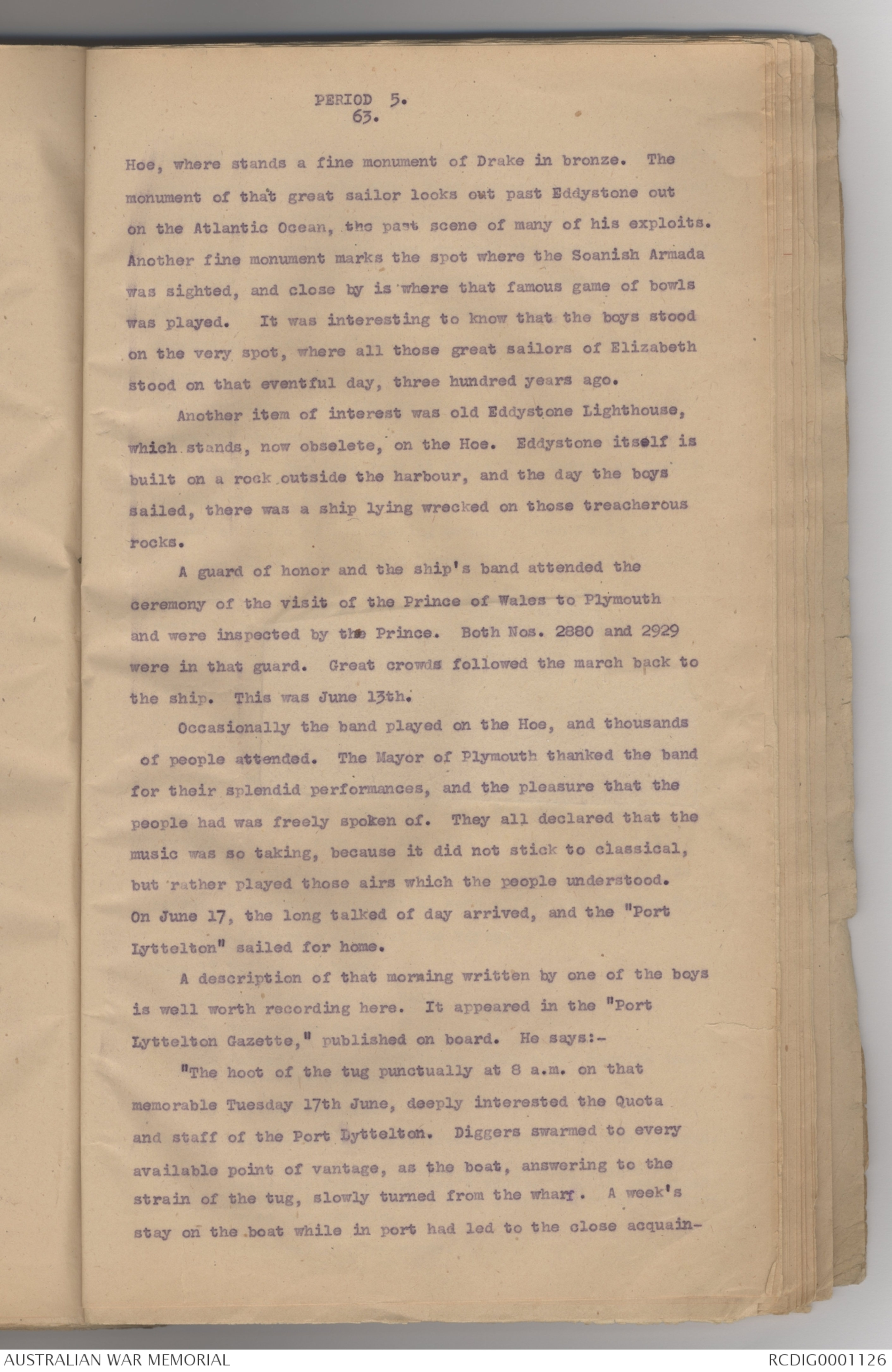
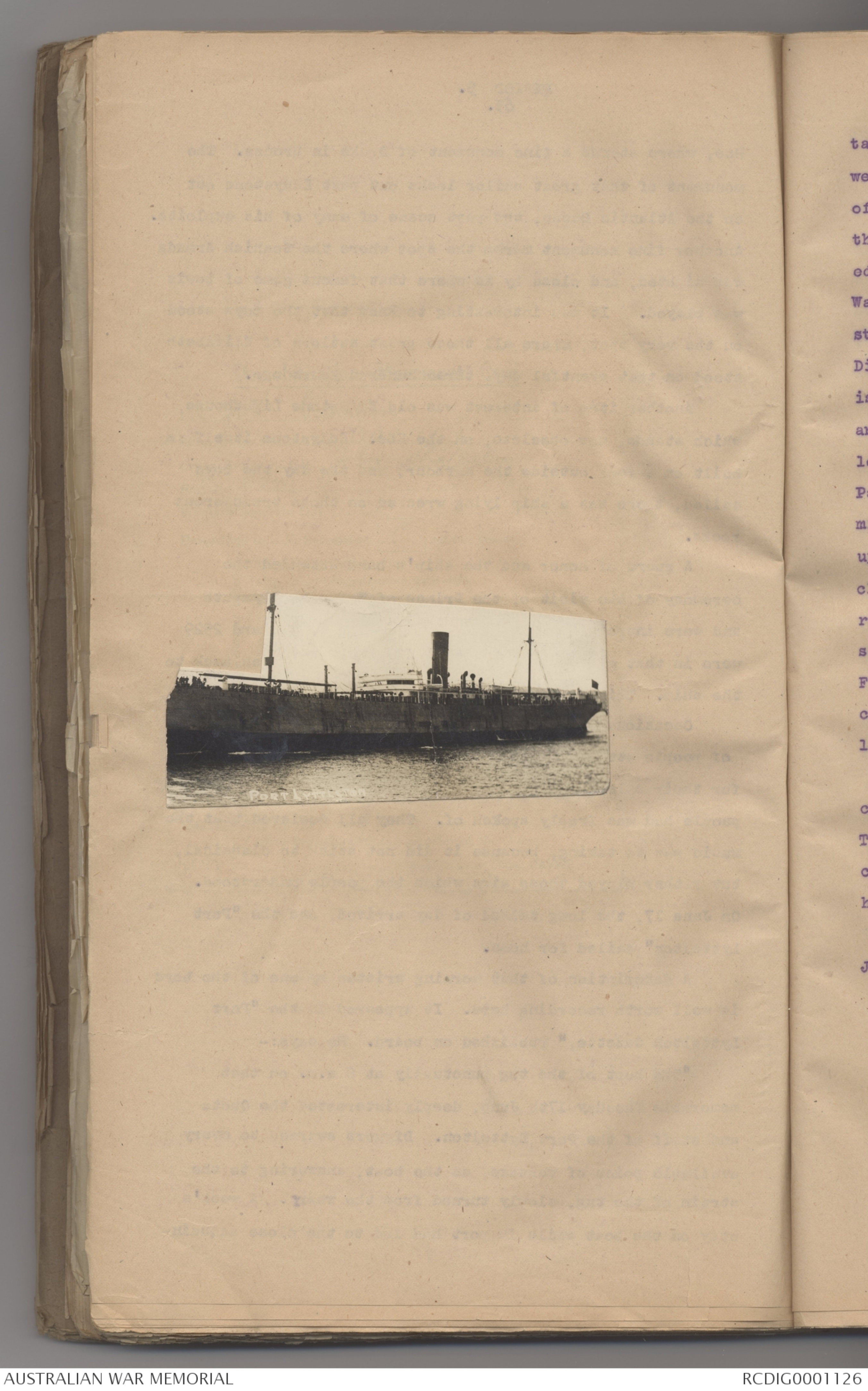
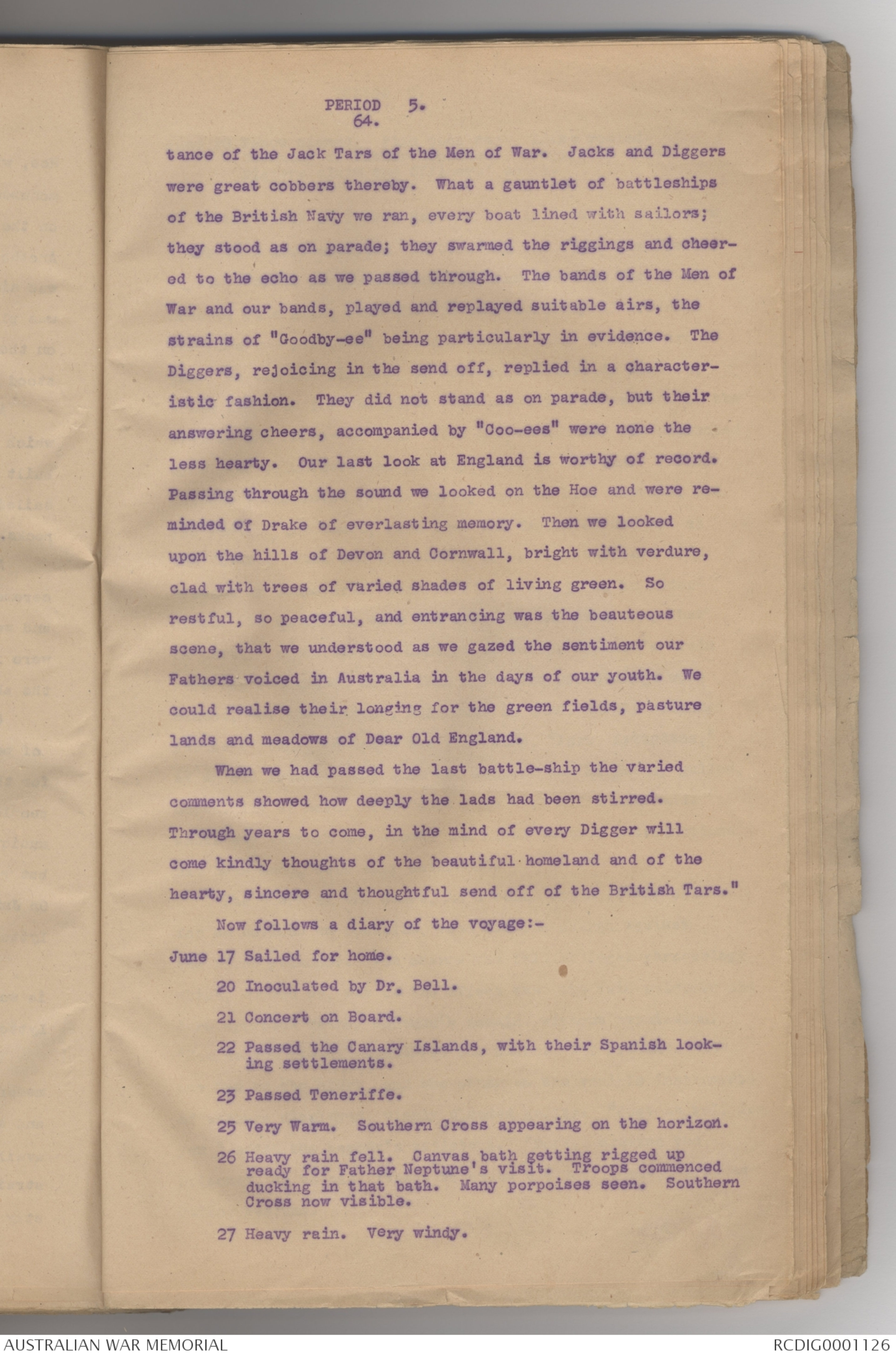
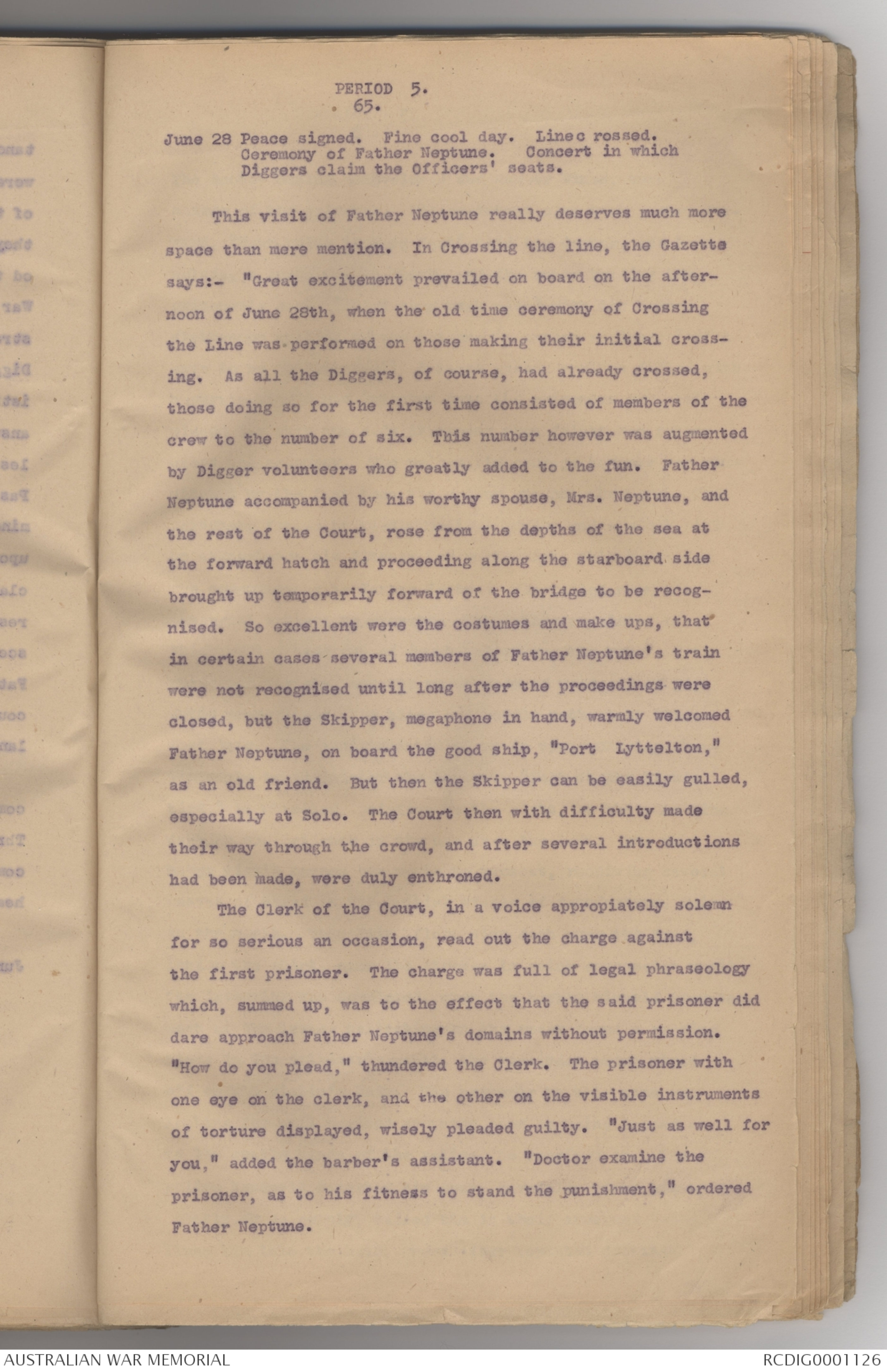
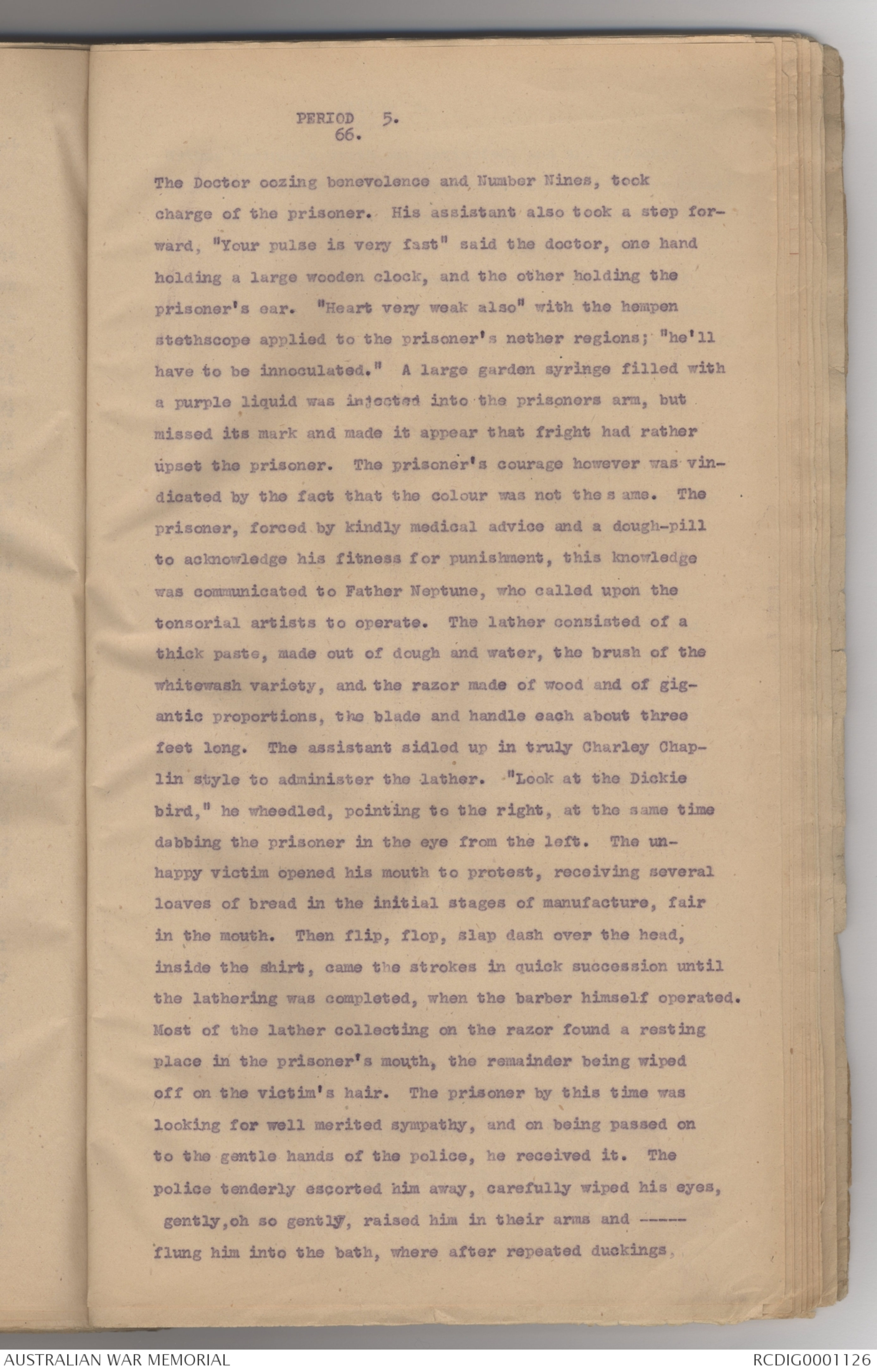
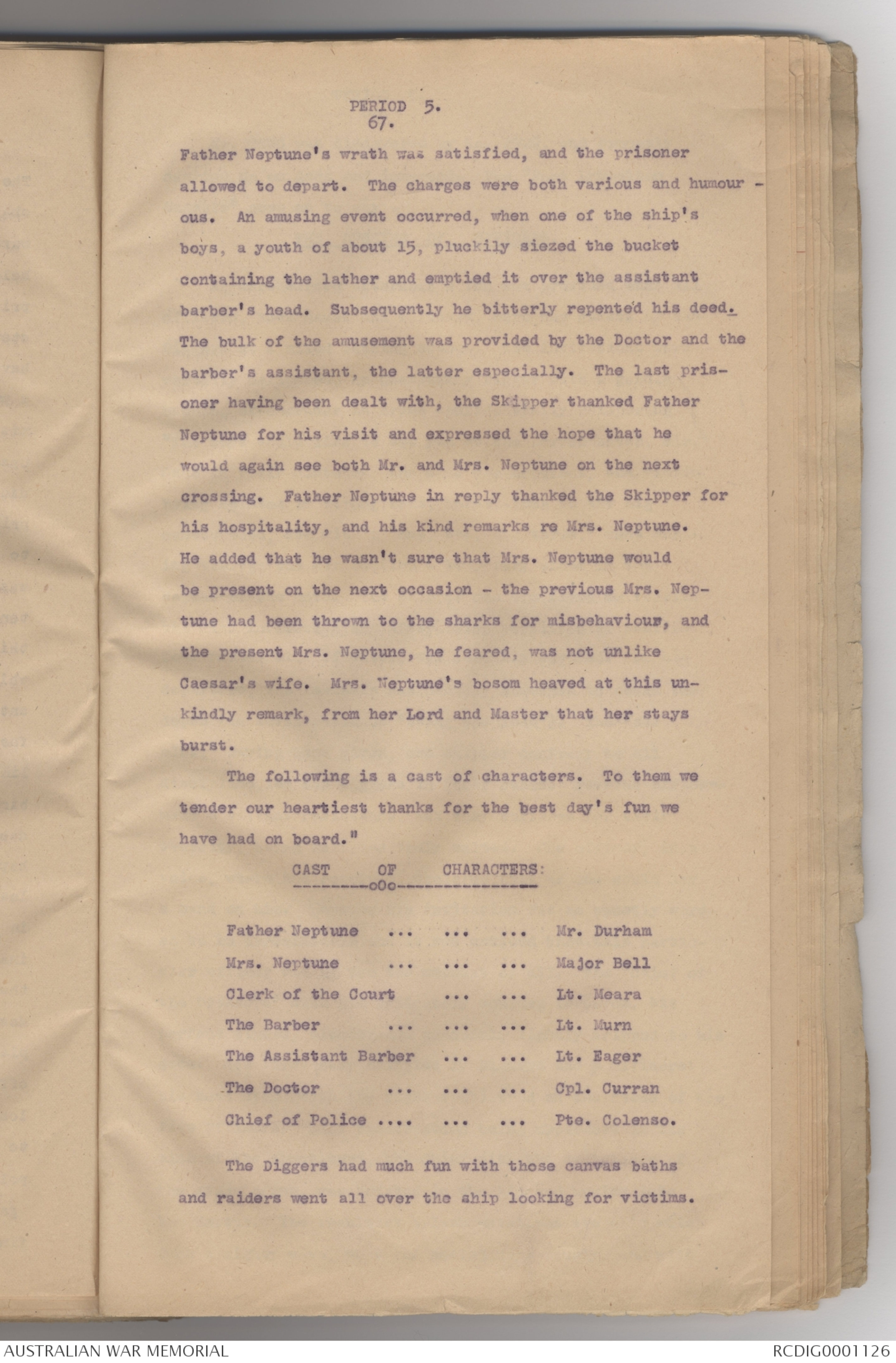
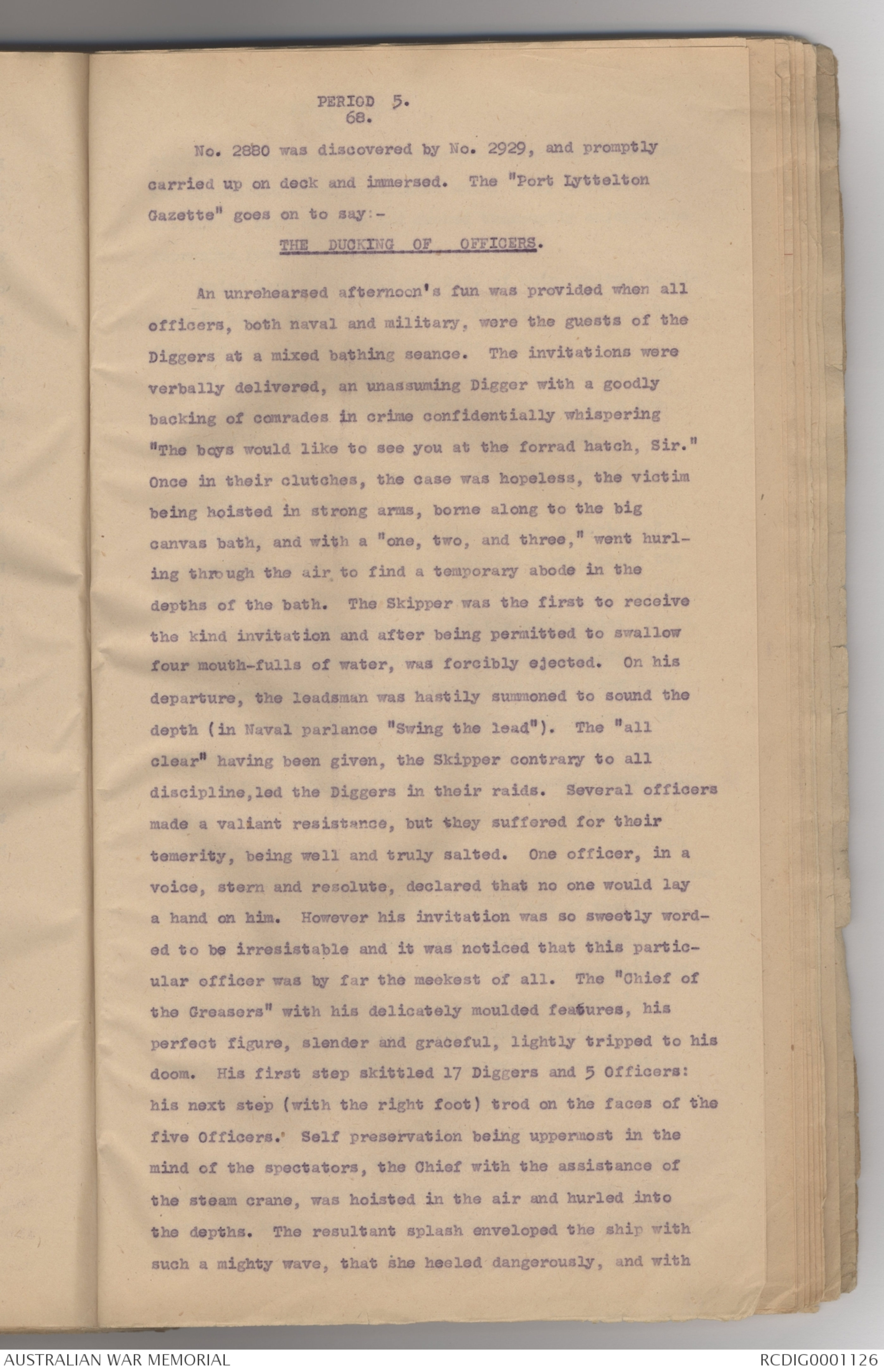
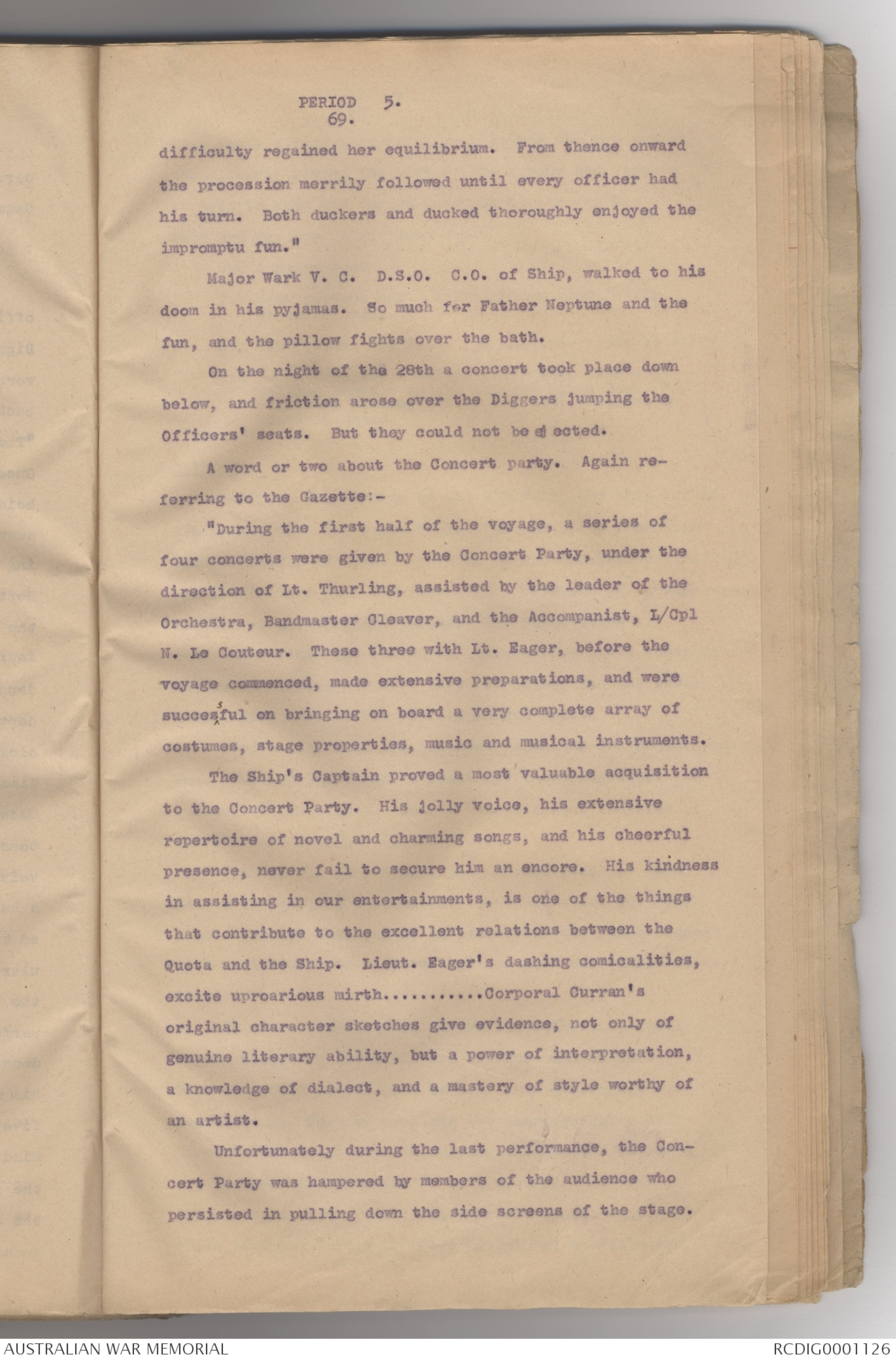
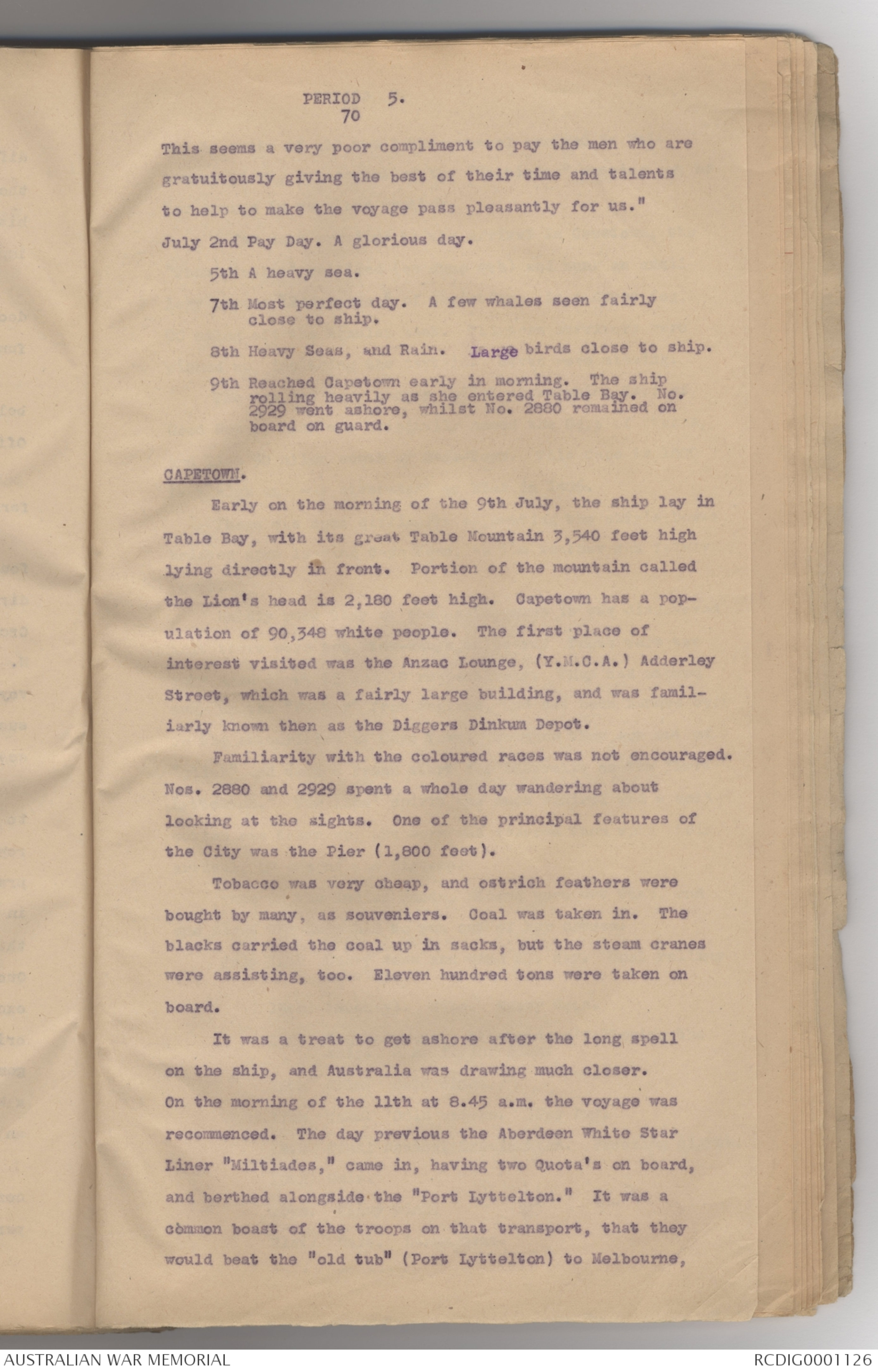
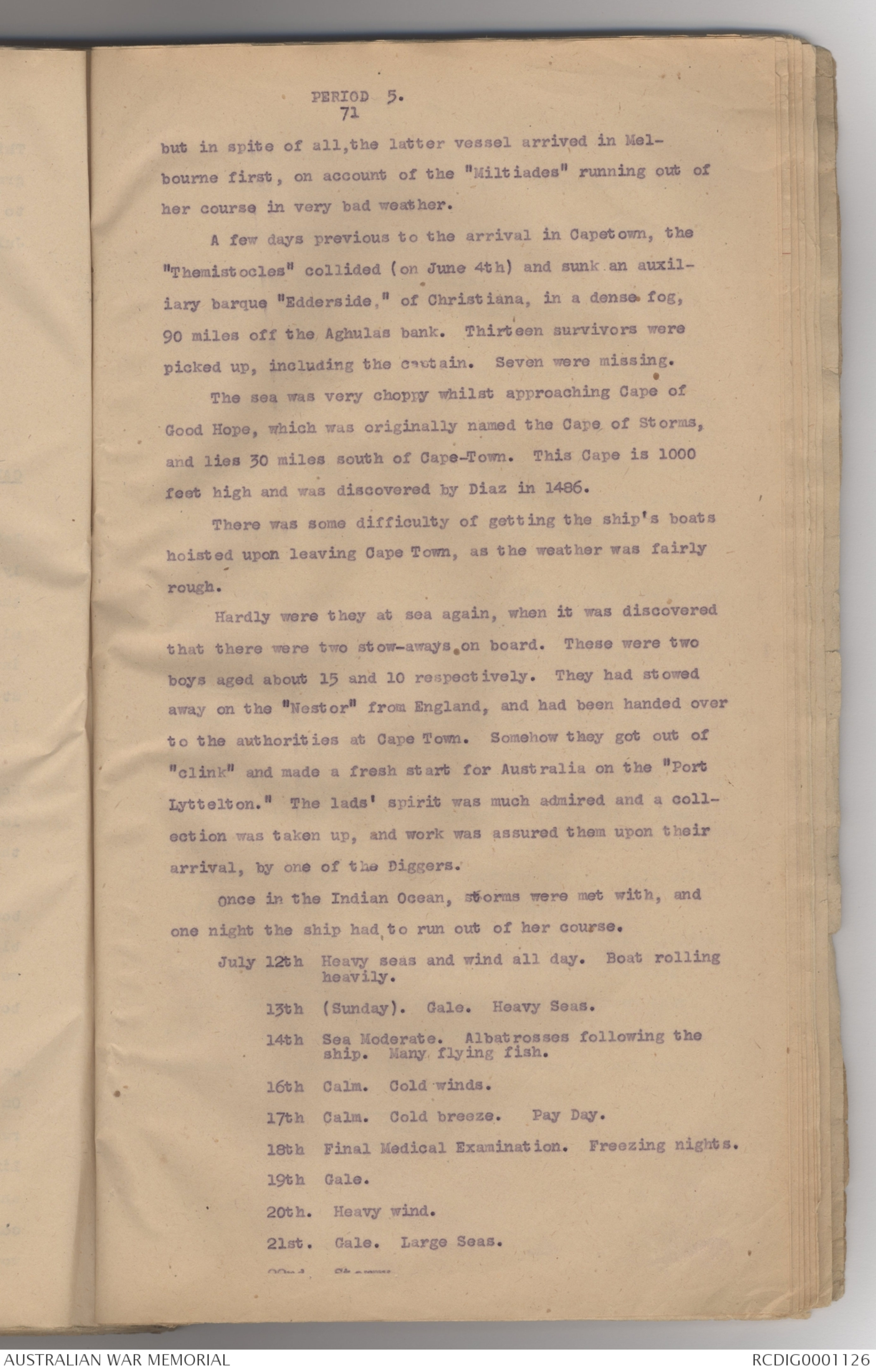
PERIOD 5.
63.
Hoe, where stands a fine monument of Drake in bronze. The
monument of that great sailor looks out past Eddystone out
on the Atlantic Ocean, the past scene of many of his exploits.
Another fine monument marks the spot where the Spanish Armada
was sighted, and close by is where that famous game of bowls
was played. It was interesting to know that the boys stood
on the very spot, where all those great sailors of Elizabeth
stood on that eventful day, three hundred years ago.
Another item of interest was old Eddystone Lighthouse,
which stands, now obsolete, on the Hoe. Eddystone itself is
built on a rock outside the harbour, and the day the boys
sailed, there was a ship lying wrecked on those treacherous
rocks.
A guard of honor and the ship's band attended the
ceremony of the visit of the Prince of Wales to Plymouth
and were inspected by the Prince. Both Nos. 2880 and 2929
were in that guard. Great crowds followed the march back to
the ship. This was June 13th.
Occasionally the band played on the Hoe, and thousands
of people attended. The Mayor of Plymouth thanked the band
for their splendid performances, and the pleasure that the
people had was freely spoken of. They all declared that the
music was so taking, because it did not stick to classical,
but rather played those airs which the people understood.
On June 17, the long talked of day arrived, and the "Port
Lyttelton" sailed for home.
A description of that morning written hy one of the boys
is well worth recording here. It appeared in the "Port
Lyttelton Gazette," published on board. He says:-
"The hoot of the tug punctually at 8 a.m. on that
memorable Tuesday 17th June, deeply interested the Quota
and staff of the Port Lyttelton. Diggers swarmed to every
available point of vantage, as the boat, answering to the
strain of the tug, slowly turned from the wharf. A week's
stay on the boat while in port had led to the close acquaintance
Photograph - see original
PERIOD 5.
64.
of the Jack Tars of the Men of War. Jacks and Diggers
were great cobbers thereby. What a gauntlet of battleships
of the British Navy we ran, every boat lined with sailors;
they stood as on parade; they swarmed the riggings and cheered
to the echo as we passed through. The bands of the Men of
War and our bands, played and replayed suitable airs, the
strains of "Goodby-ee" being particularly in evidence. The
Diggers, rejoicing in the send off, replied in a characteristi
fashion. They did not stand as on parade, but their
answering cheers, accompanied by "Coo-ees" were none the
less hearty. Our last look at England is worthy of record.
Passing through the sound we looked on the Hoe and were reminded
of Drake of everlasting memory. Then we looked
upon the hills of Devon and Cornwall, bright with verdure,
clad with trees of varied shades of living green. So
restful, so peaceful, and entrancing was the beauteous
scene, that we understood as we gazed the sentiment our
Fathers voiced in Australia in the days of our youth. We
could realise their longing for the green fields, pasture
lands and meadows of Dear Old England.
When we had passed the last battle-ship the varied
comments showed how deeply the lads had been stirred.
Through years to come, in the mind of every Digger will
come kindly thoughts of the beautiful homeland and of the
hearty, sincere and thoughtful send off of the British Tars.
Now follows a diary of the voyage:-
June 17 Sailed for home.
20 Inoculated by Dr. Bell.
21 Concert on Board.
22 Passed the Canary Islands, with with their Spanish
looking settlements.
23 Passed Teneriffe.
25 Very Warm. Southern Cross appearing on the horizon.
26 Heavy rain fell. Canvas, bath getting rigged up
ready for Father Neptune's visit. Troops commenced
ducking in that bath. Many porpoises seen. Southern
Cross now visible.
27 Heavy rain. Very windy.
PERIOD 5.
65.
June 28 Peace signed. Fine cool day. Line c rossed.
Ceremony of Father Neptune; Concert in which
Diggers claim the Officers' seats.
This visit of Father Neptune really deserves much more
space than mere mention. In Crossing the line, the Gazette
says:- "Great excitement prevailed on board on the afternoon
of June 28th, when the old time ceremony of Crossing
the Line was performed on those making their initial crossing.
As all the Diggers, of course, had already crossed,
those doing so for the first time consisted of members of the
crew to the number of six. This number however was augmented
by Digger volunteers who greatly added to the fun. Father
Neptune accompanied by his worthy spouse, Mrs. Neptune, and
the rest of the Court, rose from the depths of the sea at
the forward hatch and proceeding along the starboard side
brought up temporarily forward of the bridge to be recognised.
So excellent were the costumes and make ups, that
in certain cases several members of Father Neptune's train
were not recognised until long after the proceedings were
closed, but the Skipper, megaphone in hand, warmly welcomed
Father Neptune, on board the good ship, "Port Lyttelton,"
as an old friend. But then the Skipper can be easily gulled,
especially at Solo. The Court then with difficulty made
their way through the crowd, and after several introductions
had been made, were duly enthroned.
The Clerk of the Court, in a voice appropiately solemn
for so serious an occasion, read out the charge against
the first prisoner. The charge was full of legal phraseology
which, summed up, was to the effect that the said prisoner did
dare approach Father Neptune's domains without permission.
"How do you plead," thundered the Clerk. The prisoner with
one eye on the clerk, and the other on the visible instruments
of torture displayed, wisely pleaded guilty. "Just as well for
you," added the barber's assistant. "Doctor examine the
prisoner, as to his fitness to stand the punishment," ordered
Father Neptune.
PERIOD 5.
66.
The Doctor oozing benevolence and Number Nines, took
charge of the prisoner. His assistant also took a step forward
"Your pulse is very fast" said the doctor, one hand
holding a large wooden clock, and the other holding the
prisoner's ear. "Heart very weak also" with the hempen
stethscope applied to the prisoner's nether regions; "he'll
have to be innoculated." A large garden syringe filled with
a purple liquid was injected into the prisoners arm, but
missed its mark and made it appear that fright had rather
upset the prisoner. The prisoner's courage however was vindicated
by the fact that the colour was not the s ame. The
prisoner, forced by kindly medical advice and a dough-pill
to acknowledge his fitness for punishment, this knowledge
was communicated to Father Neptune, who called upon the
tonsorial artists to operate. The lather consisted of a
thick paste, made out of dough and water, the brush of the
whitewash variety, and the razor made of wood and of gigantic
proportions, the blade and handle each about three
feet long. The assistant sidled up in truly Charley Chaplin
style to administer the lather. "Look at the Dickie
bird," he wheedled, pointing to the right, at tho same time
dabbing the prisoner in the eye from the left. The unhappy
victim opened his mouth to protest, receiving several
loaves of bread in the initial stages of manufacture, fair
in the mouth. Then flip, flop, slap dash over the head,
inside the shirt, came the strokes in quick succession until
the lathering was completed, when the barber himself operated.
Most of the lather collecting on the razor found a resting
place in the prisoner's mouth, the remainder being wiped
off on the victim's hair. The prisoner by this time was
looking for well merited sympathy, and on being passed on
to the gentle hands of the police, he received it. The
police tenderly escorted him away, carefully wiped his eyes,
gently, oh so gently, raised him in their arms and - - - - - - -
flung him into the bath, where after repeated duckings,
PERIOD 5.
67.
Father Neptune's wrath was satisfied, and the prisoner
allowed to depart. The charges were both various and humourous.
An amusing event occurred, when one of the ship's
boys, a youth of about 15, pluckily siezed the bucket
containing the lather and emptied it over the assistant
barber's head. Subsequently he bitterly repented his deed.
The bulk of the amusement was provided hy the Doctor and the
barber's assistant, the latter especially. The last prisoner
having been dealt with, the Skipper thanked Father
Neptune for his visit and expressed the hope that he
would again see both Mr. and Mrs. Neptune on the next
crossing. Father Neptune in reply thanked the Skipper for
his hospitality, and his kind remarks re Mrs. Neptune.
He added that he wasn't sure that Mrs. Neptune would
be present on the next occasion - the previous Mrs. Neptune
had been thrown to the sharks for misbehaviour, and
the present Mrs. Neptune, he feared, was not unlike
Caesar's wife. Mrs. Neptune's bosom heaved at this unkindly
remark, from her Lord and Master that her stays
burst.
The following is a cast of characters. To them we
tender our heartiest thanks for the best day's fun we
have had on board."
CAST OF CHARACTERS:
--------------o0o------------
Father Neptune ... ... ... Mr. Durham
Mrs. Neptune ... ... ... Major Bell
Clerk of the Court... ... ... Lt Merara
The Barber ... ... ... Lt. Murn
The Assistant Barber... ... ... Lt. Eager
The Doctor ... ... ... Cpl. Curran
Chief of Police ... ... ... Pte. Colenso.
The Diggers had much fun with those canvas baths
and raiders went all over the ship looking for victims.
PERIOD 5.
68.
No. 2880 was discovered by No. 2929, and promptly
carried up on deck and immersed. The "Port Lyttelton
Gazette" goes on to say:-
THE DUCKING OF OFFICERS.
An unrehearsed afternoon's fun was provided when all
officers, both naval and military, were the guests of the
Diggers at a mixed bathing seance. The invitations were
verbally delivered, an unassuming Digger with a goodly
backing of comrades in crime confidentially whispering
"The boys would like to see you at the forrad hatch, Sir."
Once in their clutches, the case was hopeless, the victim
being hoisted in strong arms, borne along to the big
canvas bath, and with a "one, two, and three," went hurling
through the air to find a temporary abode in the
depths of the bath. The Skipper was the first to receive
the kind invitation and after being permitted to swallow
four mouth-fulls of water, was forcibly ejected. On his
departure, the leadsman was hastily summoned to sound the
depth (in Naval parlance "Swing the lead"). The "all
clear" having been given, the Skipper contrary to all
discipline, led the Diggers in their raids. Several officers
made a valiant resistance, but they suffered for their
temerity, being well and truly salted. One officer, in a
voice, stern and resolute, declared that no one would lay
a hand on him. However his invitation was so sweetly worded
to be irresistable and it was noticed that this particular
officer was by far the meekest of all. The "Chief of
the Greasers" with his delicately moulded features, his
perfect figure, slender and graceful, lightly tripped to his
doom. His first step skittled 17 Diggers and 5 Officers:
his next step (with the right foot) trod on the faces of the
five Officers. Self preservation being uppernost in the
mind of the spectators, the Chief with the assistance of
the steam crane, was hoisted in the air and hurled into
the depths. The resultant splash enveloped the ship with
such a mighty wave, that she heeled dangerously, and with
PERIOD 5.
69.
difficulty regained her equilibrium. From thence onward
the procession merrily followed until every officer had
his turn. Both duckers and ducked thoroughly enjoyed the
impromptu fun."
Major Wark V. C. D.S.O. C.O. of Ship, walked to his
doom in his pyjamas. So much for Father Neptune and the
fun, and the pillow fights over the bath.
On the night of the 28th a concert took place down
below, and friction arose over the Diggers jumping the
Officers' seats. But they could not be ejected.
A word or two about the Concert party. Again referring
to the Gazette:-
"During the first half of the voyage, a series of
four concerts were given by the Concert Party, under the
direction of Lt. Thurling, assisted by the leader of the
Orchestra, Bandmaster Cleaver, and the Accompanist, L/Cpl
N. Le Couteur. These three with Lt. Eager, before the
voyage commenced, made extensive preparations, and were
succesful on bringing on board a very complete array of
costumes, stage properties, music and musical instruments.
The Ship's Captain proved a most valuable acquisition
to the Concert Party. His jolly voice, his extensive
repertoire of novel and charming songs, and his cheerful
presence, never fail to secure him an encore. His kindness
in assisting in our entertainments, is one of the things
that contribute to the excellent relations between the
Quota and the Ship. Lieut. Eager's dashing comicalities,
excite uproarious mirth...........Corporal Curran's
original character sketches give evidence, not only of
genuine literary ability, but a power of interpretation,
a knowledge of dialect, and a mastery of style worthy of
an artist.
Unfortunately during the last performance, the Concert
Party was hampered by members of the audience who
persisted in pulling down the side screens of the stage.
PERIOD 5.
70
This seems a very poor compliment to pay the men who are
gratuitously giving the best of their time and talents
to help to make the voyage pass pleasantly for us.
July 2nd Pay Day. A glorious day.
5th A heavy sea.
7th Most perfect day. A few whales seen fairly
close to ship.
8th Heavy Seas, and Rain. Large birds close to ship.
9th Reached Capetown early in morning. The ship
rolling heavily as she entered Table Bay. No.
2929 went ashore, whilst No. 2880 remained on
board on guard.
CAPETOWN.
Early on the morning of the 9th July, the ship lay in
Table Bay, with its great Table Mountain 3,540 feet high
lying directly in front. Portion of the mountain called
the Lion's head is 2,180 feet high. Capetown has a population
of 90,348 white people. The first place of
interest visited was the Anzac Lounge, (Y.M.C.A.) Adderley
Street, which was a fairly large building, and was familiarly
known then as the Diggers Dinkum Depot.
Familiarity with the coloured races was not encouraged.
Nos. 2880 and 2929 spent a whole day wandering about
looking at the sights. One of the principal features of
the City was the Pier (1,800 feet).
Tobacco was very cheap, and ostrich feathers were
bought by many, as souveniers. Coal was taken in. The
blacks carried the coal up in sacks, but the steam cranes
were assisting, too. Eleven hundred tons were taken on
board.
It was a treat to get ashore after the long spell
on the ship, and Australia was drawing much closer.
On the morning of the 11th at 8.45 a.m. the voyage was
recommenced. The day previous the Aberdeen White Star
Liner "Miltiades," came in, having two Quota's on board,
and berthed alongside the "Port Lyttelton." It was a
common boast of the troops on that transport, that they
would beat the "old tub" (Port Lyttelton) to Melbourne,
PERIOD 5.
71.
but in spite of all, the latter vessel arrived in Melbourne
first, on account of the "Miltiades" running out of
her course in very bad weather.
A few days previous to the arrival in Capetown, the
"Themistocles" collided (on June 4th) and sunk an auxiliary
barque "Edderside," of Christiana, in a dense fog,
90 miles off the Aghulas bank. Thirteen survivors were
picked up, including the captain. Seven were missing.
The sea was very choppy whilst approaching Cape of
Good Hope, which was originally named the Care of Storms,
and lies 30 miles south of Cape-Town. This Cape is 1000
feet high and was discovered by Diaz in 1486.
There was some difficulty of getting the ship's boats
hoisted upon leaving Cape Town, as the weather was fairly
rough.
Hardly were they at sea again, when it was discovered
that there were two stow-aways, on board. These were two
boys aged about 15 and 10 respectively. They had stowed
away on the "Nestor" from England, and had been handed over
to the authorities at Cape Town. Somehow they got out of
"clink" and made a fresh start for Australia on the "Port
Lyttelton." The lads' spirit was much admired and a collection
was taken up, and work was assured them upon their
arrival, by one of the Diggers.
Once in the Indian Ocean, storms were met with, and
one night the ship had to run out of her course.
July 12th Heavy seas and wind all day. Boat rolling
heavily.
13th (Sunday). Gale. Heavy Seas.
14th Sea Moderate. Albatrosses following the
ship. Many flying fish.
16th Calm. Cold winds.
17th Calm. Cold breeze. Pay Day.
18th Final Medical Examination. Freezing nights.
19th Gale.
20th. Heavy wind.
21st. Gale. Large Seas.
22nd. [[?]]
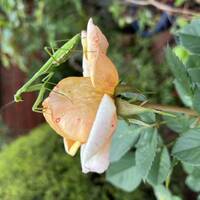 Daphne
DaphneThis transcription item is now locked to you for editing. To release the lock either Save your changes or Cancel.
This lock will be automatically released after 60 minutes of inactivity.